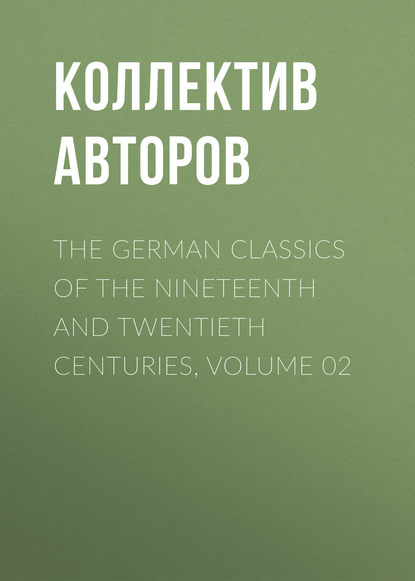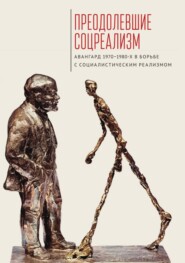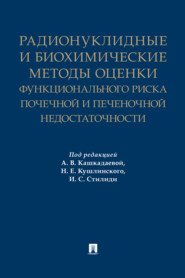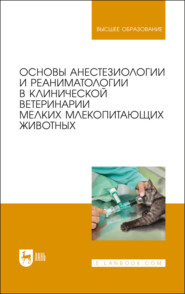По всем вопросам обращайтесь на: info@litportal.ru
(©) 2003-2024.
✖
The German Classics of the Nineteenth and Twentieth Centuries, Volume 02
Настройки чтения
Размер шрифта
Высота строк
Поля
From time to time let us not miss on either side an echo of continued existence.
G
GOETHE TO WILHELM VON HUMBOLDT
Weimar, March 17, 1832.
After a long, involuntary pause I begin as follows, and yet simply on the spur of the moment. Animals, the ancients said, were taught by their organs. I add to this, men also, although they have the advantage of teaching their organs in return.
For every act, and, consequently, for every talent, an innate tendency is requisite, working automatically, and unconsciously carrying with itself the necessary predisposition; yet, for this very reason, it works on and on inconsequently, so that, although it contains its laws within itself, it may, nevertheless, ultimately run out, devoid of end or aim. The earlier a man perceives that there is a handicraft or an art which will aid him to attain a normal increase of his natural talents, the more fortunate is he. Moreover, what he receives from without does not impair his innate individuality. The best genius is that which absorbs everything within itself, which knows how to adapt everything, without prejudicing in the least the real fundamental essence—the quality which is called character—so that it becomes the element which truly elevates that quality and endows it throughout so far as may be possible.
Here, now, appear the manifold relations between the conscious and the unconscious. Imagine a musical talent that is to compose an important score; consciousness and unconsciousness will be related like the warp and the woof, a simile that I am so fond of using. Through practice, teaching, reflection, failure, furtherance, opposition, and renewed reflection the organs of man unconsciously unite, in a free activity, the acquired and the innate, so that this process creates a unity which sets the world in amaze. This generalization may serve as a speedy reply to your query and as an explanation of the note that is herewith returned.
Over sixty years have passed since, in my youth, the conception of Faust lay before me clear from the first, although the entire sequence was present in less detailed form. Now, I have always kept my purpose in the back of my mind and I have elaborated only the passages that were of special interest to me, so that gaps remain in the second part which are to be connected with the remainder through the agency of a uniform interest. Here, I must admit, appeared the great difficulty of attaining through resolution and character what should properly belong only to a nature voluntarily active. It would, however, not have been well had this not been feasible after so long a life of active reflection, and I let no fear assail me that it may be possible to distinguish the older from the newer, and the later from the earlier; which point, then, we shall intrust to future readers for their friendly examination.
Beyond all question it will give me infinite pleasure to dedicate and communicate these very serious jests to my valued, ever thankfully recognized, and widely scattered friends while still living, and to receive their reply. But, as a matter of fact, the age is so absurd and so insane that I am convinced that the candid efforts which I have long expended upon this unusual structure would be ill rewarded, and that, driven ashore, they will lie like a wreck in ruins and speedily be covered over by the sand-dunes of time. In theory and practice, confusion rules the world, and I have no more urgent task than to augment, wherever possible, what is and has remained within me, and to redistill my peculiarities, as you also, worthy friend, surely also do in your castle.
But do you likewise tell me something about your work. Riemer is, as you doubtless know, absorbed in the same and similar studies, and our evening conversations often lead to the confines of this specialty. Forgive this delayed letter! Despite my retirement, there is seldom an hour when these mysteries of life may be realized.
GOETHE'S CORRESPONDENCE WITH ZELTER
TRANSLATED BY FRANCES H. KING
LETTER 512
Weimar, July 28, 1803.
I have followed you so often in my thoughts that unfortunately I have neglected to do so in writing. Just a few lines today, to accompany the inclosed page. Of Mozart's Biography I have heard nothing further, but I will inquire about it and also about the author. Your beautiful Queen made many happy while on her journey, and no one happier than my mother; nothing could have caused her greater joy in her declining years.
Do write me something about the performance of The Natural Daughter, frankly and without consideration for my feelings. I have a mind anyhow to shorten some of the scenes, which must seem long, even if they are excellently acted. Will you outline for me sometime the duties of a concert conductor, so much, at all events, as one of our kind needs to know in order to form a judgment of such a man, and in case of need, to be able to direct him? Madame Mara sang on Tuesday in Lauchstaedt; how it went off I do not yet know. For the songs which I received through Herr von Wolzogen I thank you mostly heartily in my own name and in the name of our friends. It was no time to think of producing them. I hope soon to send you the proof-sheets of my songs, and I beg you to keep them secret at first, until they have appeared in print.
Inclosure
You now have the Bride of Messina before you in print and as you learn the poet's intentions from his introductory essay, you will know better how to appreciate what he has done, and how far you can agree with him. I will, regarding your letter, jot down my thoughts on the subject; we can come to an understanding in a few words.
In Greek tragedy four forms of the chorus are found, representing four epochs. In the first, between the songs in which gods and heroes are extolled and genealogies, great deeds, and monstrous destinies are brought before the imagination, a few persons appear and carry the spectator back into the past. Of this we find an approximate example in the Seven before Thebes of, Eschylus. Here, therefore, are the beginnings of dramatic art, the old style. The second epoch shows us the chorus in the mass as the mystical, principal personage of the piece, as in the Eumenides and Supplicants. Here I am inclined to find the grand style. The chorus is independent, the interest centres in it; one might call this the Republican period of dramatic art; the rulers and the gods are only attendant personages. In the third epoch it is the chorus which plays the secondary part; the interest is transferred to the families, and the members and heads who represent them in the play, with whose fate that of the surrounding people is only loosely connected. Then, the chorus is subordinate, and the figures of the princes and heroes stand preëminent in all their exclusive magnificence. This I consider the beautiful style. The pieces of Sophocles stand on this plane. Since the crowd is forced merely to look on at the heroes and at fate, and can have no effect on either their special or general nature, it takes refuge in reflection and assumes the office of an able and welcome spectator. In the fourth epoch the action withdraws more and more into the sphere of private interests, and the chorus often appears as a burdensome custom, as an inherited fixture. It becomes unnecessary, and therefore, as a part of a living poetic composition, it is useless, wearisome, and disturbing; as, for example, when it is called upon to guard secrets in which it has no interest, and things of that sort. Several examples are to be found in the pieces of Euripides, of which I will mention Helen and Iphigenia in Tauris.
From all this you will see that, for a musical reconstruction of the chorus, it would be necessary to make experiments in the style of the first two epochs; and this might be accomplished by means of quite short oratorios.
* * * * *
LETTER 553
Weimar, June 1, 1805.
Since writing to you last, I have had few happy days. I thought I should die myself, and instead I lose a friend,[33 - Schiller died May 9, 1805] and with him the half of my being. I would really begin a different mode of life, but for one of my years there is no way of doing that. I only look straight ahead of me each day, and do the thing nearest to me without thinking of the consequences.
But as people in every loss and misfortune try to find a pretext for amusement, I have been urgently solicited in behalf of our theatre, and on many other sides, to celebrate on the stage the memory of the departed one. I wish to say nothing further on the subject, except that I am not disinclined to it, and all I would ask of you now is whether you are willing to assist me in the matter; and, first, whether you would furnish me with your motet—"Man lives," etc., about which I have read in the Musical Review, No. 27; also whether you would either compose some other pieces of a solemn character, or else select and make over to me some musical pieces already composed—the style of which I will indicate later—as a foundation for appropriate compositions. As soon as I know your real opinion on the subject, you shall receive further details.
Your beautiful series of little essays on orchestra organization I have left lying around till now, and the reason is that they contained a sort of satire on our own conditions.
Now Reichard wishes them for the Musical Review. I hunt them up again, look them over, and I feel that I really could not deprive the Intelligence Page of our Literatur-Zeitung of them. Some of our conditions here have changed, and, after all, a man may surely be allowed to censure those things which he did not try to hinder.
Privy Councillor Wolf of Halle is here at present. If only I could hope to see you also here this year! Would it not be possible for you to come to Lauchstaedt the end of July, so as to help, there on the spot, in the preparation and performance of the above-mentioned work?
Think it over and only tell me there is a possibility of it; we shall then be able to devise the means of bringing it to pass.
* * * * *
LETTER 606
Weimar, October 30, 1808.
The world of art is just now too much run down for a young man to be able to realize exactly where he stands. People always search for inspiration everywhere but in the place where it originates, and if they do once catch sight of the source, then they cannot find the path leading to it. Therefore I am reduced to despair by half a dozen of the younger poetic spirits, who, though endowed with extraordinary natural talent, will scarcely accomplish much that I can ever take pleasure in. Werner, Ochlenschlaeger, Arnim, Brentano and others are still working and practising at their art, but everything they do is absolutely lacking in form and character. Not one of them can understand that the highest and only operation of nature and art is the creation of form, and in the form, detail, so that each single thing shall become, be, and remain something separate and important. There is no art in letting your talent go to suit your humor and convenience.
The sad part of it is that the humorous, because it has no support and no law within itself, sooner or later degenerates into melancholy and bad temper. We have been forced to experience the most horrible examples of this in Jean Paul (see his last production in the Ladies' Calendar) and in Görres (see his Specimens of Writing). Moreover, there are always people enough to admire and esteem that sort of thing, because the public is always grateful to every one who tries to turn its head.
Will you be obliging enough, when you have a quarter of an hour's spare time, to sketch for me, in a few rough lines, the aberrations of our youthful musicians? I should like to compare them with the errors of the painters; for a man must once for all set his heart at rest about these things, execrate the whole business, stop thinking about the culture of others, and employ the short time that remains to him on his own works. But even while I express myself thus disagreeably, I must, as always happens to good-natured blusterers, contradict myself immediately, and beg you to continue your interest in Eberwein at least until Easter; for then I will send him to you again. He has acquired great confidence in you, and great respect for your institution, but unhappily even that does not mean much with young people. They still secretly think it would also be possible to produce something extraordinary by their own foolish methods. Many people gain some comprehension that there is a goal, but they would like very much to reach it by loitering along mazy paths.
You have been sufficiently reminded of us throughout this month by the newspapers. It was worth much to be present in person at these events. I also came in for a share of the favorable influence of such an unusual constellation. The Emperor of France was very gracious to me. Both Emperors decorated me with stars and ribbons, which we desire in all modesty thankfully to acknowledge. Forgive me for not writing you more about the latest events. You must have already wondered when you read the papers that this stream of the great and mighty ones of earth should have rolled on as far as Weimar, and even over the battlefield of Jena. I cannot refrain from inclosing to you a remarkable engraving. The point where the temple is placed, is the farthest point toward the north-east reached by Napoleon on this tour. When you visit us, I will place you on the spot where the little man with the cane is shown parceling off the world.
* * * * *
LETTER 640
Weimar, February 28, 1811.
I have read somewhere that the celebrated first secretary of the London Society, Oldenburg, never opened a letter until he had placed pen, ink, and paper before him, and that he then and there, immediately after the first reading, wrote down his answer. Thus he was able to meet comfortably the demands of an immense correspondence. If I could have imitated this virtue, so many people would not now be complaining of my silence. But this time your dear letter just received has roused in me such a desire to answer, by recalling to my mind all the fullness of our life during the summer, that I am writing these lines, if not immediately after the first reading, at least on awaking the next morning.
I think I anticipated that the good Pandora would slow down somewhat when she reached home again. Life in Töplitz was really too favorable to this sort of work, and your meditations and efforts were so steadily and undividedly centred upon it, that an interruption could not help calling forth a pause. But leave it alone; there is so much done on it already that, at the right moment, the remainder will, in all likelihood, come of its own accord.
I cannot blame you for declining to compose the music to Faust. My proposition was somewhat ill-considered, like the undertaking itself. It can very well rest in peace for another year; for the trouble which I had in working over the Resolute Prince[34 - By Calderon] has about exhausted the inclination which we must feel when we set about things of that sort. This piece has indeed turned out beyond all expectation, and it has given much pleasure to me and to others. It is no small undertaking to conjure up a work written almost two hundred years ago, for an entirely different clime, for a people of entirely different customs, religion, and culture, and to make it appear fresh and new to the eyes of a spectator. For nowhere is anything antiquated and without direct appeal more out of place than on the stage.
Touching my works you shall, before everything else, receive the thirteenth volume. It is very kind of you not to neglect the Theory of Color; and the fact that you absorb it in small doses will have its good effect too. I know very well that my way of handling the matter, natural as it is, differs very widely from the usual way, and I cannot demand that every one should immediately perceive and appropriate its advantages. The mathematicians are foolish people, and are so far from having the least idea what my work means that one really must overlook their presumption. I am very curious about the first one who gets an insight into the matter and behaves honestly about it; for not all of them are blindfolded or malicious. But, at any rate, I now see more clearly than ever what I have long held in secret, that the training which mathematics give to the mind is extremely one-sided and narrow. Yes, Voltaire is bold enough to say somewhere: "I have always remarked that geometry leaves the mind just where it found it." Franklin also has clearly and plainly expressed a special aversion to mathematicians, in respect to their social qualities, and finds their petty contradictory spirit unbearable.
As concerns the real Newtonians, they are in the same case as the old Prussians in October, 1806. The latter believed that they were winning tactically, when they had long since been conquered strategically. When once their eyes are opened they will be startled to find me already in Naumburg and Leipzig, while they are still creeping along near Weimar and Blankenheim. That battle was lost in advance; and so is this. The Newtonian Theory is already annihilated, while the gentlemen still think their adversary despicable. Forgive my boasting; I am just as little ashamed of it as those gentlemen are of their pettiness. I am going through a strange experience with Kugelchen, as I have done with many others. I thought I was making him the nicest compliment possible; for really the picture and the frame had turned out most acceptably, and now the good man takes offence at a superficial act of politeness, which one really ought not to neglect, since many persons' feelings are hurt if we omit it. A certain lack of etiquette on my part in such matters has often been taken amiss, and now here I am troubling some excellent people with my formality. Never get rid of an old fault, my dear friend; you will either fall into a new one, or else people will look upon your newly acquired virtue as a fault; and no matter how you behave, you will never satisfy either yourself or others. In the meantime I am glad that I know what the matter is; for I wish to be on good terms with this excellent man.
Regarding the antique bull, I should propose to have him carefully packed in a strong case, and sent to me for inspection. In ancient times these things were often made in replica, and the specimens differ greatly in value. To give any good bronze in exchange for another would be a bad bargain, as there are scarcely ever duplicates of them, and those that we do find are doubly interesting on account of their resemblances and dissimilarities. The offer I could make at present is as follows: I have a very fine collection of medals, mostly in bronze, from the middle of the fifteenth century up to our day. It was collected principally in order to illustrate to amateurs and experts the progress of plastic art, which is always reflected in the medals. Among these medals I have some very beautiful and valuable duplicates, so that I could probably get together a most instructive series of them to give away. An art lover, who as yet possessed nothing of this description, would in them get a good foundation for a collection, and a sufficient inducement to continue. Further, such a collection, like a set of Greek and Roman coins, affords opportunity for very interesting observations; indeed it completes the conception furnished us by the coins, and brings it up to present times. I may also say that the bull would have to be very perfect, if I am not to have a balance to my credit in the bargain above indicated.
Something very pleasing has occurred to me in the last few days; it was the presentation to me, from the Empress of Austria, of a beautiful gold snuff-box with a diamond wreath, and the name Louisa engraved in full. I know you too will take an interest in this event, as it is not often that we meet with such unexpected and refreshing good fortune.
* * * * *
LETTER 665
Weimar, December 3, 1812.
Your letter telling me of the great misfortune which has befallen your house,[35 - Zelter's eldest son had shot himself.] depressed me very much, indeed quite bowed me down; for it reached me in the midst of very serious reflections on life, and it is owing to you alone that I have been able to pluck up courage. You have proved yourself to be pure refined gold when tried by the black touchstone of death. How beautiful is a character when it is so compact of mind and soul, and how beautiful must be a talent that rests on such a foundation.

















